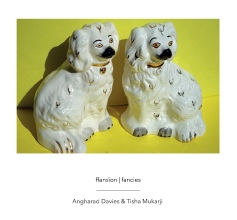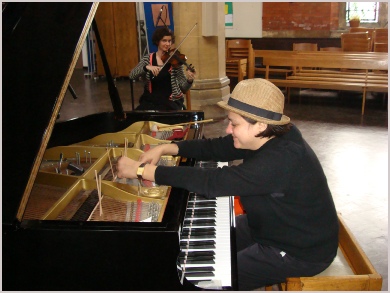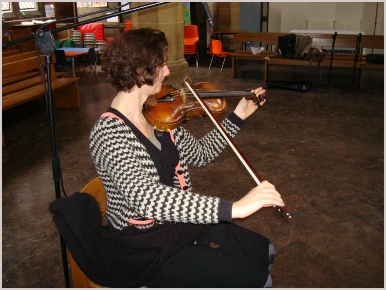Another Timbre TimHarrisonbre

at99 Angharad Davies & Tisha Mukarji - ffansïon | fancies
Angharad Davies - violin, Tisha Mukarji - piano
1 - ffansi i 8.25
2 - for Lucio i 2:27
3 - ffansi ii 8:58
4 - ffansi iii 7:03 youtube extract
5 - ffansi iv 13:57
6 - for Lucio ii 2:37
7 - ffansi v 9:20
Recorded at St Catherine’s Church, Hatcham, South London on 5th & 6th February 2016

Interview with Angharad Davies
When did you first play with Tisha and how often have you played together in the
ensuing years?
I first heard Tisha playing a solo set at the Bridewell Theatre in 2005. It was the LMC's 14th Festival of Experimental Music. I was instantly struck by Tisha's sense of poise, her ability to give sounds breathing space and her powerful palette. Her sense of timing and supersonic attentiveness contributes to a cohesiveness in structure that is impossible to ignore and makes for a luxurious position to build or destroy. I have a real sense that the music is continually unfolding even when it seemingly comes to a dead end.
Having heard Tisha in 2005, I didn't get to play with her again until May 2007 at Music Fields Companion at the Sage Gateshead organised by Barry Esson. This was a trio with Andrea Neumann. We recorded endspace in July 2007 and I've played with Tisha about eight times since then spread over 2008, 2010, 2011, 2012, plus a recording in a trio with Dimitra Lazaridou Chatzigoga in 2011, and a residency at Q-02, Brussels in 2013.
So, the very first track on ffansïon/fancies is the first time we've played together
since 2013.
Is it easy to maintain a musical relationship when you don't see each other
for long periods?
I feel that some musical relationships are similar to very good friendships
where there is mutual respect for personal growth but you can equally just pick up
where you left off. This duo for me is very much like this.
In many ways the new duo
disc ffansïon/fancies is quite different from your earlier CD endspace. How would
you describe the difference and do you feel that your practice as musicians have
developed along parallel paths?
I'm glad you think the music is quite different from
endspace and personally I am in a very different place musically to where I was almost
10 years ago. These days it's all about finding a way to be more comfortable, and
things that I found challenging then, thankfully, don't take up so much of my thinking
time any more.
I was really struck by how much the building where ffansïon/fancies was
recorded shaped and became part of the music. Though neither of you nor Tisha had
been there before, it felt that the church's acoustic marked the music in many ways.
Do you think that is right?
Absolutely. The building and its surroundings are integral
to any improvisation and becomes the 3rd, 4th, 5th etc voice. I was very much affected
by the church's gigantic proportions, its acoustics, the possibility of not finding
the off switch for the droned pitched heating, the roadworks outside, the car alarm,
the wind on the second day of recording.......the list is actually endless but all
plays a part in shaping the direction of the music.
Yes, I felt that the space led you towards certain pitches that were particularly resonant in the church, and some of the pieces are built around these. Also I think it encouraged you to play louder than you might have otherwise in order to take advantage of the church’s acoustic.
Everything sounded so good in there so, of course we were going to find ways of attempting to fill the space and make the building sing.
I was also struck by the way you and Tisha re-worked material across the two days. We hadn’t originally planned to record over two days, but circumstances meant that we had to, and you really used the fact. Several of the pieces are developments of ideas which emerged in improvisations on the first day but which you then took further, or tried to explore more precisely on the second day. It struck me that this is a particularly fruitful way of using improvisation.
This is the first time we’ve worked like this and it focused the second day of recording but we still fucked up!

Recording ‘ffansïon’ at St Catherine’s Church, Hatcham
Reviews
“It is fitting that the duo of violinist Angharad Davies and inside pianist Tisha Mukarji is included in this series. While this album bears catalogue number at99, the duo's previous release on the label was the excellent Endspace (2007), bearing number at5, in the infancy of Another Timbre. Since then they have been stalwarts of the label, appearing together in a trio with zither player Dimitra Lazaridou-Chatzigoga on Outwash (2012) and separately on many more Another Timbre releases. So it is a pleasure to welcome another duo album by the pair, Ffansïon / Fancies, its bilingual Welsh-English title acknowledging Davies's Welsh roots.
Recorded in January 2016, the album consists of seven tracks, five entitled "Ffansïon / Fancies i—v" and the other two "For Lucio i & ii." The Another Timbre website describes this as "a disc of improvisations and composed pieces" but the actual music effectively blurs the boundaries to the extent that it is impossible to tell composition from improvisation. Comparisons between similarly titled pieces do not provide any definite answers. No matter. Davies and Mukarji are both such confident, sure-footed improvisers, and so secure in each other's company, that their music could be entirely improvised, entirely annotated, or anywhere on the spectrum in between.
Aside from that, the salient qualities of their music are the distinctive ways they each play their instruments, the understanding and empathy they display, and the logic and economy of their music, which carries the listener along with them. This album is as good as anything the two have done together or separately. An album to return to time after time, year after year.”
John Eyles, All About Jazz
“ffansïon | fancies is the second release of the duo Angharad Davies & Tisha Mukarji. We don't often get a chance to hear good improvisation these days, so take your chance now. It's a great piano/violin duo recorded in a big church, seven improvisations with a large palette of sounds, silences and resonances. Minimal but not reductionnist, abstract and harmonic, full of extented techniques and great melodies, it's just beautiful, sensitive, and played with a lot of creativity.”
Julien Heraud, Improv-Sphere
“This CD was entirely improvised by Angharad Davies on violin and Tisha Mukarji on piano. It was recorded at St Catherine’s Church on Telegraph Hill in south east London, and I really like the way that – in Morton Feldman’s phrase – they don’t push the sounds around. I think the way that they work together and then don’t work together, and the way that they incorporate the sound of the church, listening to the space and bringing the sound into their improvisation, I think all that works really well… And I like the hesitancy, the fact that you don’t quite know where they’re going. I find that fascinating…..They generate some really captivating timbral combinations and textures, and every piece is completely different on the CD, which I suppose is testament to their imaginative skills and creativity to put together such a varied sequence of improvisations….”
Robert Worby and Matt Kaner, reviewing Ffansion on BBC Radio 3’s Hear and Now
“I have around 20 releases featuring Angharad Davies's fine playing….(but) I think this one might be the finest, due in no small part to the improbably heightened telepathy connecting her to her unsung playing partner Tisha Mukarji.”
Jesse Goin
“Angharad Davies and Tisha Mukarji’s contribution to Another Timbre’s “Violin+1” series takes the already blurry distinction between composed and improvised music and blurs it beyond meaning. As odd a title as Ffansïon | Fancies is, it encapsulates the process of investigation and refinement evident everywhere in Davies and Mukarji’s sympathetic playing. “Fancy” here connotes the formation of images, synthetic activity, and the work of the imagination—a de- and re-construction of both the piano and the violin that produces a pseudo-Cubist view of both instruments. Exploded and rearranged, they slip in and out of familiar configurations, darting constantly between energy and form.
Though it was recorded over the course of two days at St. Catherine’s Church in London, Ffansïon | Fancies was meant to be a one-day engagement. That extra time meant Davies and Mukarji, who hadn’t played together in three years, could work with and develop ideas they would have otherwise had to leave in a rawer state the day before. Davies claims this is the first time either of them had operated in that fashion, but the results don’t show it. These seven pieces, despite their seemingly random and unplanned structures, sing with preternatural harmony. Not harmony in the sense of chords and tones, but in the sense of congruity, texture, and space. Using extended techniques, they push their sound well beyond that of a duo’s, sublimating steel strings and horsehair into vaporous colors and anxious rhythms that might typically require four or five musicians to generate.
Nevertheless, the music always sounds tight and controlled, almost thematic. When Mukarji dives into the piano’s low end on “Ffansi | Fancy IV,” Davies lets up on her bow and finds a way to match the piece’s new pace with a slower cadence and surprising contrasts, like rubbing on the strings in such a way that the violin becomes a percussion instrument, a stringed head to be played with brushes. At some point, Davies almost makes it sound like a flute. That kind of vertical movement keeps these pieces in a constant state of tension, even as the tempos slow and freeze, and that tension is replicated in other directions as well: between silence and fullness, melody and toneless noise, patterns and undifferentiated pulses. Davies and Mukarji’s minds and ears must always be active and sensitive. Their music, however, glides between lethargic ambience and dynamic, hard-edged motion.
Which is yet another sign of the subterfuge running through their work. There’s an element of deception in Ffansïon | Fancies, and maybe in the name of the “Violin+1” series too. Seen and heard live, some of that illusion could fall apart, but on record at least, Davies and Mukarji draw circles around themselves so that they can hide within them. The music they make as independent improvisers fuses almost from the beginning, at which point their sound transforms into an image of their performance. It is impossible to see the image and the manner in which it was painted at the same time, yet the album unfurls in sequence, just like all music must. It’s a remarkable effect, like seeing and hearing in four dimensions. As with the Cubists, the specifics are multifaceted, but the overall impression is rooted in the limitation and freedom of the present.”
Lucas Schleicher, Brainwashed
”Ffansïon | Fancies is the new album from Angharad Davies & Tisha Mukarji. Released by Another Timbre, a label that generally does excellent work, and this album is no exception. This isn’t actually a duo album. It’s a trio with the third member being St. Catherine’s Church in South London, where the album was recorded by Simon Reynell. Mukarji’s piano is a perfect foil for Davies’ violin and they way they both interact with the acoustics in the Church is awe inspiring. The sounds emanating from the piano are both familiar and deeply alien at times as Mukarji wrestles an impressive palate of sound from the interior of the piano. “Ffansi III” sounds both deeply organic and entirely synthetic, the sound of a large grassy field fed through a modular synthesizer made of shark teeth and decaying electronics. But it’s a piano. And a violin. And a church. Easily one of the best albums of the year. Their last album came out in 2007. If we have to wait another nine years for the third, it will be worth the wait.”
David Menestres
“Violinist Angharad Davies and pianist Tisha Mukarji recorded a set of improvisations over two days this February, released under the title ffansïon | fancies. In an interview on the website it mentions that the second day of recording was forced by “circumstances”, but this helped the album immensely. Material from the first day was evidently reworked, developed and refined for takes used on the final release. (“It struck me that this is a particularly fruitful way of using improvisation.”) The results show the benefit of additional time for reflection. Each piece reveals a focus on detail without losing sight of an overall direction or shape. Sounds are allowed to develop and change over time without rambling, giving each piece a character that can range from spiky pointillism to deconstructed folk music.”
Ben Harper, Boring Like a Drill
“In spite of knowing each other since 2005, violinist Angharad Davies and pianist Tisha Mukarji don’t meet often; even more infrequently they commit their perlustration of echoing locations to tape, this being only the second time after 2007’s Endspace. In both cases, good old Simon Reynell – the man who has turned a considerable number of British crucifixes into witnesses of significant improvisational events – brought his recording gear to capture essential traces of unstudied dialogue. In this particular instance the outcome reflects a sui generis seductiveness dressed in austere clothes.
In addition to five main segments named “Ffansi”, two shorter ones (“For Lucio” – Capece, I suppose but am not sure) are distinguished by clear discrepancies in terms of pitch duration and overall dynamics. In essence, the latter mostly comprise staccato punctuations, diverse gradations of corresponding tones, flickering luminescences and, in general, a higher degree of resonant fragmentariness. Definitely interesting, but the Fancies represent the most accurate portrait of the duo’s personality.
As a matter of fact, the kernel of Davies and Mukarji’s research lies in the interaction between themselves and the critically canorous features of London’s St Catherine’s Church. They just relinquish the self, and let the instruments do the talking. Either through fluttering shades of elongated whispers or via sparse chordal designs sustaining insistent arco work, these women come extremely close to the unexposed spot where every harmonic, including the less audible, counts exactly as the others during precious instants of meditative radiance. Still, no trace of ritualism. These sounds reward our attention without masked meanings, strongly informing the interplay while retaining their inherent characteristics. The musicians act as the proverbial conduit for the functional channeling of unattached forces, the resulting music a fine blend of conscious restraint and perceptible inquietude that leaves no opportunities to low-budget definitions.”
Massimo Ricci, Touching Extremes
Discount price £5